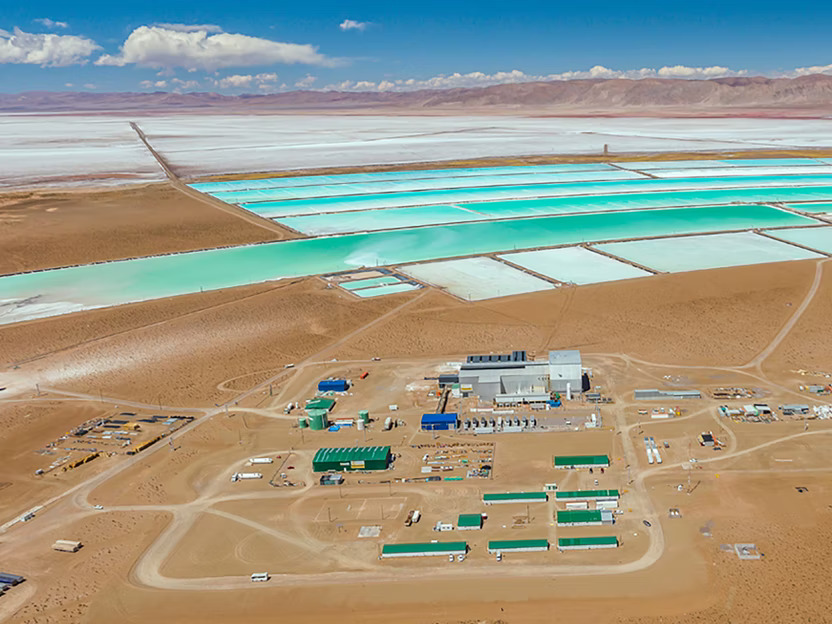Timeline: Owners of Arcadium’s lithium assets through the years

Rio Tinto is in talks with lithium producer Arcadium for a buyout that would make the Anglo-Australian mining company a major player in the global lithium industry.
Reuters was first to report the talks on Friday. The companies confirmed discussions on Monday.
Arcadium was formed only in January by the merger of Australia-based Allkem and US-based Livent which brought together lithium mines, processing facilities and deposits across four continents. Those companies were themselves the creations of past deals that cobbled together some of the world’s most prized lithium assets.
Here is a timeline of major events leading to Arcadium’s creation.
1944: The Lithium Corp of America is founded in part to help supply the US government with a type of lithium needed for the Manhattan project. The new company begins digging for the metal in North Carolina.
May 1985: Agricultural chemical producer FMC buys Lithium Corp of America and grows to become the largest producer in the world, a title it eventually cedes.
October 1997: FMC begins lithium production at Argentina’s Salar de Hombre Muerto in the country’s far north using evaporation ponds.
February 1998: With Argentina production under way, FMC closes its lithium mine in North Carolina.
June 1998: FMC adds an early version of Direct Lithium Extraction to its Salar de Hombre Muerto operations, becoming the first company to use the technology in tandem with ponds. Engineers at the site are still considered world experts in DLE integration.
December 2007: Australia-based Orocobre begins trading on the Australian Stock Exchange after discovering the Olaroz lithium deposit in Argentina while searching for gold and copper. (“Orocobre” is a portmanteau of the Spanish words for those two metals.)
October 2009: Galaxy Resources begins construction on Western Australia’s Mt. Cattlin lithium mine, one of the country’s largest sources of the battery metal. The mine is mothballed by Arcadium in September 2024 amid low lithium prices.
January 2010: Australian-based Orocobre agrees to develop Olaroz with a sister company to Toyota Motor.
December 2014: Orocobre opens the Olaroz lithium facility.
May 2018: Galaxy releases an updated feasibility study for its Sal de Vida lithium project in Argentina. The project is still under development as of October 2024.
October 2018: FMC spins off its lithium division as Livent.
October 2018: Galaxy releases an environmental study on its proposed James Bay lithium project in Canada. The asset had yet to be developed as of October 2024.
April 2020: Orocobre buys Advantage Lithium in a deal that gives it control of the Cauchari lithium deposit in Argentina, near one from Lithium Argentina.
November 2020: Livent agrees to form a joint venture to buy Quebec’s troubled Nemaska lithium project. The company also extends a lucrative deal to supply the battery metal to Tesla.
April 2021: Australia’s Orocobre says it will pay $1.4 billion for smaller rival Galaxy Resources in an all-stock deal that brought together hard rock, brine and chemicals assets across Australia, Argentina, Canada and Japan.
November 2021: Orocobre changes its name to Allkem, a reference to lithium’s position near the top of the Periodic Table of Elements.
August 2022: The US government approves the Inflation Reduction Act, a positive harbinger for lithium-producing countries that have trade deals with Washington, including Australia and Canada.
August 2022: General Motors agrees to prepay Livent $198 million for a guaranteed supply of lithium.
December 2023: Livent invests in ILiAD, a DLE technology developer.
January 2024: Allkem and Livent merge to form Arcadium, with each company getting six seats on the new firm’s board of directors. The new company’s name is a reference to its multiple assets across Argentina, Australia, Canada and elsewhere.
October 2024: Rio Tinto and Arcadium confirm a Reuters report that they are in negotiations.
(By Ernest Scheyder and Clara Denina; Editing by Matthew Lewis)
{{ commodity.name }}
{{ post.title }}
{{ post.date }}




Comments